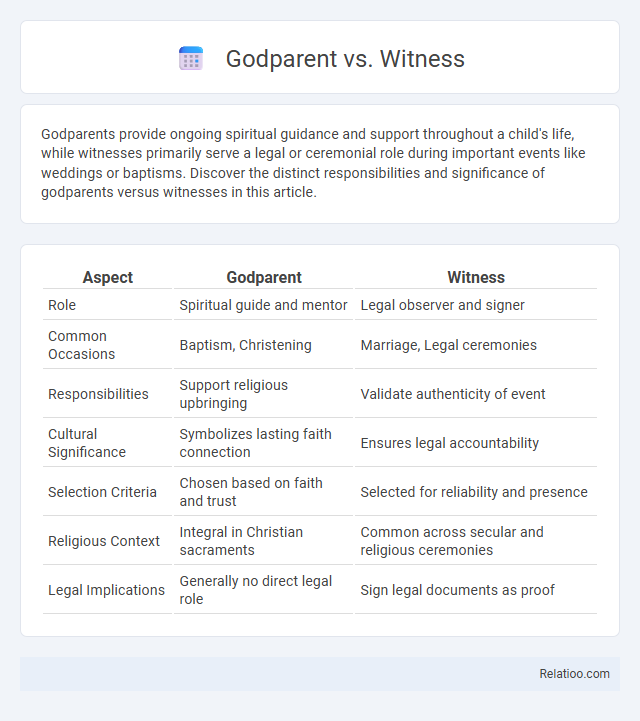Godparents provide ongoing spiritual guidance and support throughout a child's life, while witnesses primarily serve a legal or ceremonial role during important events like weddings or baptisms. Discover the distinct responsibilities and significance of godparents versus witnesses in this article.
Table of Comparison
| Aspect | Godparent | Witness |
|---|---|---|
| Role | Spiritual guide and mentor | Legal observer and signer |
| Common Occasions | Baptism, Christening | Marriage, Legal ceremonies |
| Responsibilities | Support religious upbringing | Validate authenticity of event |
| Cultural Significance | Symbolizes lasting faith connection | Ensures legal accountability |
| Selection Criteria | Chosen based on faith and trust | Selected for reliability and presence |
| Religious Context | Integral in Christian sacraments | Common across secular and religious ceremonies |
| Legal Implications | Generally no direct legal role | Sign legal documents as proof |
Understanding the Role of a Godparent
A godparent serves as a spiritual guide and mentor, often chosen to support a child's religious upbringing and moral development. Unlike witnesses, who primarily verify the authenticity of a ceremony or event, godparents have an ongoing commitment to the child's faith journey and personal growth. Understanding the distinct responsibilities of a godparent highlights their lifelong role in nurturing the child's spiritual and ethical values.
Defining the Role of a Witness
A Witness primarily serves as a legal or ceremonial observer who validates the authenticity of a document or event, often signed or affirmed in your presence to ensure its legitimacy. Unlike a Godparent, who assumes a lifelong spiritual and moral guidance role, a Witness's responsibility is limited to confirming the occurrence and details of a specific act, such as a wedding or will signing. Understanding the distinct definition and scope of a Witness's role is essential for ensuring the proper execution and recognition of formal commitments.
Key Responsibilities of Godparents
Godparents hold key responsibilities including guiding the child's spiritual growth, supporting their moral development, and often assisting parents in religious education throughout the child's life. Unlike witnesses, whose primary role is to attest to the validity of a sacrament or legal event, godparents are committed to a lifelong mentorship and faith-based support role. Their duties extend beyond the ceremony, emphasizing ongoing involvement and care in the child's faith journey.
Key Duties of Witnesses
Witnesses primarily serve to observe and verify the signing of legal or ceremonial documents, ensuring the authenticity and voluntary consent of the parties involved. Their key duties include confirming the identity of the signers, preventing fraudulent practices, and signing the document themselves to provide legal validation. While godparents offer spiritual guidance and support, witnesses hold a crucial role in providing legal recognition and accountability in official proceedings.
Godparent vs Witness: Major Differences
Godparents play a significant role in a child's spiritual upbringing and are often chosen to provide guidance and support throughout the child's life, especially in religious contexts. Witnesses, on the other hand, serve primarily to attest to the authenticity of a ceremony or legal event, such as a wedding or baptism, without any ongoing responsibilities beyond the event itself. The major difference lies in the godparent's lifelong spiritual and moral commitment versus the witness's role limited to verification and legal acknowledgment.
Religious Significance of Godparents
Godparents hold a unique religious role, primarily in Christian traditions, as spiritual guides responsible for the child's religious upbringing and faith development. Witnesses, by contrast, serve a legal purpose, verifying the authenticity of the ceremony without ongoing spiritual obligations. The godparent's commitment often includes sponsoring the child's baptism and supporting their lifelong religious journey, emphasizing a deeper ecclesiastical responsibility than that of a mere witness.
Legal Importance of Witnesses
Witnesses hold critical legal importance in validating documents, contracts, and testimonies, ensuring authenticity and preventing fraud. Unlike godparents, whose role is primarily spiritual and ceremonial, witnesses provide observable verification that a party signed a document willingly and competently. Your legal rights often rely on credible witnesses to uphold agreements and support court cases effectively.
Choosing the Right Godparent or Witness
Choosing the right godparent or witness involves understanding their distinct roles and responsibilities in significant life events. Godparents provide spiritual guidance and long-term support in a child's religious upbringing, while witnesses primarily serve to attest to the authenticity of a legal or ceremonial act, such as a wedding or baptism. Selecting someone trustworthy, committed, and aligned with the values of the event ensures meaningful participation and lasting impact.
Cultural Variations in Godparent and Witness Roles
Godparent and witness roles vary significantly across cultures, influencing their responsibilities and social significance. In many Catholic traditions, godparents hold spiritual guidance duties during baptism, while witnesses primarily validate legal acts like marriage ceremonies. Your understanding of these roles should consider regional customs where witnesses might also act as moral supporters, reflecting distinct cultural and religious values.
Frequently Asked Questions: Godparent vs Witness
Godparents and witnesses serve distinct roles in religious and legal ceremonies, with godparents primarily responsible for spiritual guidance and support throughout a child's life, while witnesses verify the authenticity of the event and signatures. Frequently asked questions often highlight the difference in duties, revealing godparents are typically chosen during baptism or confirmation, whereas witnesses are more commonly associated with weddings and legal documents. Understanding these roles helps clarify expectations, as godparents commit to ongoing mentorship, whereas witnesses fulfill a temporary, formal requirement.

Infographic: Godparent vs Witness
 relatioo.com
relatioo.com